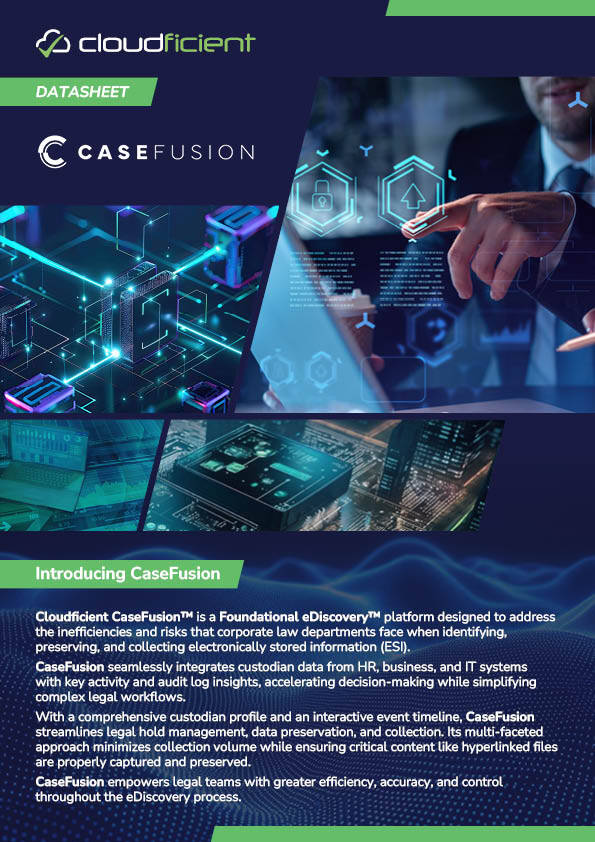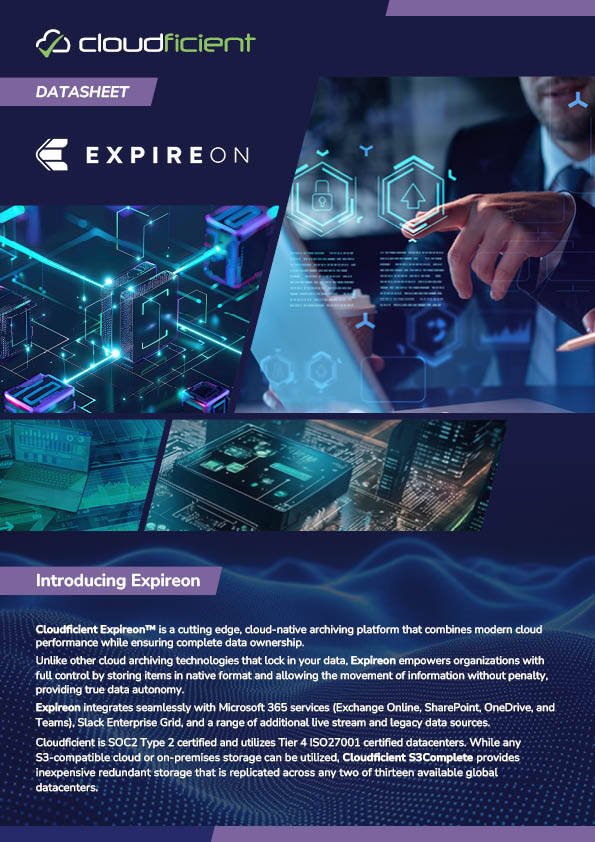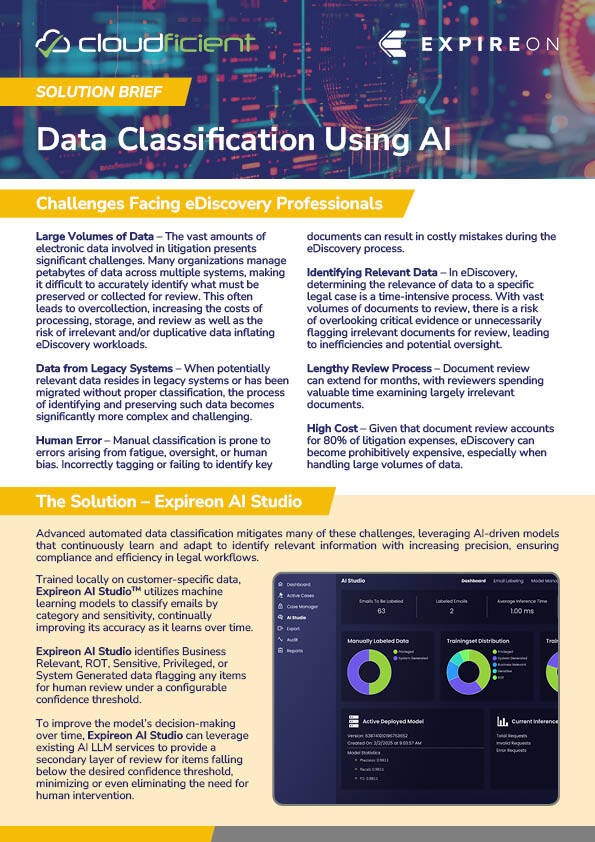- Solutions
- Foundational eDiscovery
- Custodian Mapping & Data Identification
Using Data Mapping to Break Down Information Silos
Organizations struggle with fragmented data ecosystems where critical information is scattered across multiple platforms, departments, and custodians. Without comprehensive data mapping and strategic custodian identification, legal teams face significant risks during eDiscovery proceedings. Information silos create blind spots that can compromise case defensibility, inflate review costs, and expose organizations to sanctions.
Challenges of Custodian Mapping & Data Identification
Effective data identification and custodian mapping form a foundation for defensible eDiscovery by establishing clear data lineage, identifying relevant custodians early, and breaking down organizational barriers that impede comprehensive data discovery. Organizations that implement strategic data mapping processes gain competitive advantages through reduced collection costs, faster case timelines, and stronger legal positions.
Information Silos & Organizational Data Fragmentation
Traditional discovery methods struggle with the complex webs of information that Enterprises use to create and house data. Organizations typically lack visibility into where data resides, and who controls access to it, risking:
-
-
Departmental isolation: Business units operating independent systems, without cross-functional data mapping, make comprehensive data discovery nearly impossible during litigation.
-
Legacy system complexity: Outdated databases and file servers may contain crucial historical data, but they are often disconnected from data mapping initiatives.
-
Cloud platform proliferation: The adoption of SaaS applications often results in data repositories that fall outside traditional IT oversight and established data identification processes.
-
Geographic distribution: Global organizations struggle to map data across international boundaries where local regulations and systems complicate unified data discovery.
-
These fragmented environments force legal teams to rely on incomplete data identification, potentially missing critical evidence and compromising case outcomes.


Data Discovery & Case Mapping Complexity
Traditional data discovery approaches fail when confronted with the complexity of modern enterprises. Interconnected systems and diverse data formats require sophisticated mapping strategies. Organizations struggle to create comprehensive inventories that accurately reflect their data landscape and incorporate:
-
Multi-platform integration: Data mapping needs to account for interactions not just within, but between, email systems, collaboration platforms, databases, and file repositories.
-
Dynamic data relationships: Hyperlinked content and cross-platform references create dependencies that standard data identification methods frequently overlook.
-
Version control challenges: Documents exist in multiple versions across various platforms, requiring advanced data mapping to maintain accuracy and completeness. Without proper version identification, organizations often collect and send all versions for review, multiplying volumes and costs when only the most relevant versions are needed.
-
Real-time data evolution: Active business operations continuously generate new data relationships that static mapping approaches do not accommodate.
Without robust data mapping capabilities, organizations face extended discovery timelines and inflated costs from over-collection and processing inefficiencies.
Data Custodian & Data Steward Access Challenges
Identifying and engaging the right custodians represents one of the most complex aspects of foundational eDiscovery, especially when custodian relationships and data stewardship responsibilities are obscured by information silos. Organizations often lack clear documentation of:
-
Role ambiguity: Employees often serve multiple functions across departments, making it difficult to identify all relevant custodians for specific data sets when litigation begins.
-
Organizational changes: Leavers, restructuring, and role transitions create gaps in custodian identification that can compromise data preservation efforts.
-
Permission complexities: Layered access controls across multiple platforms obscure who has access to critical repositories.
-
Stewardship confusion: It can be difficult to distinguish between data custodians using the data, and data stewards who manage system access and retention policies. Role ambiguity and unclear stewardship documentation force teams to cast wide nets and collection from dramatically more custodians than is necessary, exponentially increasing review costs.
These access challenges delay case initiation and increase the risk of incomplete data preservation, potentially exposing organizations to spoliation claims.


Hyperlinked Content Identification Gaps
Modern collaboration relies heavily on hyperlinked documents, embedded references, and dynamic content that traditional identification tools were not built for. These interconnected file relationships represent critical evidence that can determine case outcomes if properly preserved and identified. Organizations often lack a tool that accounts for:
-
Reference preservation: SharePoint, Teams, and other collaboration platforms create complex webs of document relationships that need to be captured.
-
Dynamic content challenges: Live documents that update in real-time, requiring specialized data identification approaches to ensure complete preservation.
-
Embedded media complexity: Modern documents that contain links that exist separately from the primary file.
-
Cross-platform dependencies: Data often references files stored in different systems, creating identification challenges that require comprehensive data mapping.
Organizations that fail to address hyperlinked content gaps risk presenting incomplete evidence and facing challenges to their discovery completeness.
Database Identification & eDiscovery Forensics Complexity
Enterprise databases contain huge amounts of structured data that require specialized identification and case mapping approaches that go beyond traditional file and custodian-based methods. Organizations struggle to identify relevant database content without comprehensive data mapping that documents system relationships and data flows due to:
-
Structured data challenges: Identifying document relationships requires sophisticated queries and data identification methods that traditional eDiscovery tools cannot accommodate.
-
System integration mapping: Enterprise systems share data through APIs and integration points that need to be documented to ensure complete identification.
-
Forensic preservation requirements: Database evidence requires specialized collection methods that maintain data integrity while supporting forensic analysis.
-
Access log complexity: Database activity logs contain critical evidence but require advanced data mapping to identify relevant entries and relationships.
These database identification challenges extend discovery timelines and require specialized expertise that many tools lack.


Data Culling & Digital Evidence Processing
Effective data culling depends on accurate data identification and mapping to ensure relevant information is preserved while eliminating unnecessary data that inflates processing costs. Organizations without a comprehensive data mapping solution face significant challenges in making informed decisions, such as:
-
Relevance determination: Data culling requires a deep understanding of the relationships between data and business content that can't be provided by incomplete data mapping.
-
Processing efficiency: Poor data identification leads to over-collection that dramatically increases processing costs and delays timelines.
-
Quality control gaps: Without proper data mapping, organizations struggle to verify that culling decisions have preserved all relevant evidence.
-
Defensibility concerns: Inadequate documentation of data identification and culling processes can expose organizations to concerns over discovery completeness.
Organizations that implement strategic data mapping achieve significant cost savings through more precise culling and reduced processing volumes.
Establish Comprehensive Data Mapping & Data Lineage Documentation
Create detailed inventories that document data sources, custodian relationships, and system interdependencies across your entire enterprise. Implement automated discovery tools that continuously scan systems to identify new repositories and update existing data maps. Perform regular audits to verify mapping accuracy and identify gaps that could compromise future eDiscovery efforts.
Implement Automated Data Custodian & Data Steward Tracking
Deploy integrated systems that track employee roles, system access, and data relationships in real time. Automated tracking should monitor role changes, department transfers, and access reconfigurations that affect certain data sets. Organizations with robust tracking systems respond faster to litigation holds and precisely target fewer custodians while maintaining completeness, reducing review volumes and costs significantly.
Optimize Data Deduplication & Data Culling Processes
Leverage AI-powered classification tools to analyze content for context, metadata, and system relationships which help make informed culling decisions. Implement deduplication processes that account for file versions, platform-specific formatting, and hyperlinked content relationships that traditional tools often miss. Organizations that optimize culling processes achieve significant cost savings while maintaining highly defensible discovery processes.
Leverage Technology for Scalable Data Discovery & Database Identification
Deploy advanced data discovery tools that can access structured databases, cloud platforms, and legacy systems through standardized APIs and integration points. Technology platforms should provide real-time visibility into data mapping status and custodian tracking across all enterprise systems. Organizations that leverage complete technology solutions achieve faster case initiation and more complete data identification while reducing manual effort and eliminating over-broad custodian collection that inflates review costs.
Preserve Hyperlinked Content Relationships & Version Control
Collection tools that can capture hyperlinked content at the reference level, preserving relationships between documents stored across different platforms and systems must be implemented. Establish version control procedures that identify the most current document versions while maintaining historical copies that can contain relevant information. Organizations need to properly address hyperlinked content challenges so they can produce more complete evidence and avoid discovery disputes about missing information.
Implement AI-Powered Data Classification During Identification
Deploy machine learning algorithms that analyze content context, communication patterns, and data relationships to identify potentially relevant information early in the EDRM process. Create validation workflows that verify AI classification decisions while maintaining the efficiency gained from automated processes. Organizations that effectively leverage AI during data identification achieve significant cost reductions while improving discovery completeness and accuracy.
Our Solutions
Cloudficient’s data identification and custodian mapping solutions transform complex enterprise data challenges into manageable, defensible processes that reduce costs and improve case outcomes.
CaseFusion - Unifies identification, custodian mapping, and data discovery through integrated workflows that connect HR systems, IT infrastructure, and legal operations for comprehensive data visibility and automated custodian tracking that enables precise custodian tracking that enables precise custodian scoping to reduce review volumes by at least 60% to reduce discovery costs significantly.
Expireon - Provides comprehensive data archiving with hyperlinked file intelligence that preserves document relationships and maintains complete context. Expireon improves data identification and mapping across enterprise systems, while eliminating duplicate and irrelevant content that would otherwise inflate review costs.
Expireon AI Studio - Enhances identification through AI-powered classification and categorization that intelligently analyses content, identifies key custodians, and reduces manual review requirements while maintaining discovery defensibility and reducing costs by lowering review volumes by up to 40%.
Frequently Asked Questions
What does a custodian mean in law?
In legal contexts, a custodian refers to any person or entity that has responsibility for maintaining, preserving, or controlling access to documents, data, or other evidence. Legal custodians have obligations to preserve relevant information when litigation is anticipated and may be required to testify about the authenticity and custody of evidence.
What is a custodian in legal hold?
A custodian in legal hold is an individual who has possession, custody, or control of potentially relevant information for litigation. Custodians can include employees, contractors, or third parties who create, receive, store, or manage documents and data that may be subject to discovery requests.
What is a custodian map?
A custodian map is a comprehensive system of documentation that identifies individuals who have access or control over specific data sources within and organization. It includes information about each custodian’s role, the systems they access, the types of data they manage, and their relationship to potentially relevant information for legal matters.
What does it mean to cull documents?
Document culling is the process of systematically reviewing and filtering large volumes of data to identify potentially relevant information while eliminating clearly irrelevant materials. Culling reduces the volume of data that must be processed, reviewed, and produced during discovery, significantly reducing costs and timelines. Effective culling can reduce data volumes and translates directly to cost savings by eliminating irrelevant content before it reaches the most expensive phase: review.
How does a custodian map help you cull documents?
A custodian map enables more precise document culling by identifying which individuals are most likely to possess relevant information based on their roles, responsibilities, and data access patterns. This targeted approach allows legal teams to focus culling efforts on high-value data sources while avoiding over-collection from irrelevant custodians. By identifying the right custodians instead of defensibly collecting too many, organizations can drastically reduce datasets and substantially reduce downstream review and processing costs.
What is personal identifiable information?
Personal identifiable information (PII) consists of data that can identify a specific individual, including names, addresses, phone numbers, email addresses, social security numbers, financial account information, and biometric data. Organizations must carefully handle PII during data identification and culling to comply with privacy regulations while still meeting discovery obligations.
-3.png?width=250&height=33&name=Untitled%20design%20(18)-3.png)
-3.png?width=527&height=69&name=Untitled%20design%20(18)-3.png)
.png?width=600&height=79&name=Untitled%20design%20(18).png)





